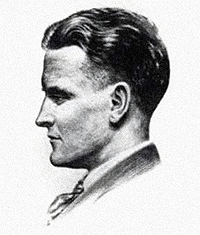“It has been said by a celebrated person,” Edmund Wilson writes at the onset of his 1922 essay on F. Scott Fitzgerald, “that to meet F. Scott Fitzgerald is to think of a stupid old woman with whom someone has left a diamond;”
she is extremely proud of the diamond and shows it to everyone who comes by, and everyone is surprised that such an ignorant old woman should possess so valuable a jewel; for in nothing does she appear so inept as in the remarks she makes about the diamond.
 Fitzgerald would have been twenty-five at the time Wilson, then only twenty-six himself, composed this remarkable sentence. No matter how often I have read it, its power to sandbag has not diminished. Who starts a critical essay this way? That is to say, who starts an essay that, as it unfolds, will praise its subject’s moral seriousness as a writer, his pure talent, his musicality, his promise (Fitzgerald had yet to publish The Great Gatsby or Tender is the Night)—with a bit of hyperventilate hearsay that has the same texture as the worst gossip, (“It has been said…”)?
Fitzgerald would have been twenty-five at the time Wilson, then only twenty-six himself, composed this remarkable sentence. No matter how often I have read it, its power to sandbag has not diminished. Who starts a critical essay this way? That is to say, who starts an essay that, as it unfolds, will praise its subject’s moral seriousness as a writer, his pure talent, his musicality, his promise (Fitzgerald had yet to publish The Great Gatsby or Tender is the Night)—with a bit of hyperventilate hearsay that has the same texture as the worst gossip, (“It has been said…”)?
Of course, the sentence, dangled like a glittering lure into the busy waters of whichever magazine it appeared in first, was meant to hook a reader. This low feat accomplished, Wilson then barrels forward, performing a technically admirable double reverse as he moves down his argumentative field. First, he distances himself from the baseness he has just disseminated, saying that the anecdote given is misleading (“The person who invented this simile did not know Fitzgerald very well”); that Fitzgerald was not “inept” (“on the contrary, exhilaratingly clever”). This established, that Fitzgerald is not “in the least stupid,” Wilson then pivots and jukes into the opening he has made for himself: “Yet there is a symbolic truth in the description quoted above:”
it is true that Fitzgerald has been left with a jewel which he doesn’t know quite what to do with. For he has been given imagination without intellectual control of it; he has been given the desire for beauty without an aesthetic ideal; and he has been given a gift for expression without very many ideas to express.
Here at last we have a thesis. As to the matter of proving it out, Wilson, characteristically, writes with a certainty of his own certainty that precludes proof, or nearly. Wilson is happy to defend his cruelties but loathe to corroborate, textually, his blessings. Upon writing “This Side of Paradise is one of the most illiterate books of any merit ever published,” he does deal from the bottom of his deck a four card hand of quotations that flush with malaprop. And yet, of Fitzgerald’s “instinct for graceful and vivid prose” we get no more than Wilson’s instinct. The single long quotation in the piece, seven lines, is of Bernard Shaw describing the Irish people, a portrait frame that fits, Wilson assures us, Fitzgerald. Wilson fills that frame, not with proof, but his own portraiture: “F. Scott Fitzgerald is a rather childlike fellow, very much wrapped up in his dream of himself and his projection of it on paper.”
Wilson’s essay is more a dream of Fitzgerald than literary criticism. Read alone, one would think Wilson had all the right instincts as a reader (his generalizations about Fitzgerald the writer jibe with the sense a reader has of him) but all the wrong ones of a critic. Reading Wilson’s collected criticism disproves this piecemeal dismissal, of course, and suggests, as the fortune cookie trumpets, that a smattering of everything is a knowledge of nothing. A smattering of Wilson can produce just such a suspicion.






